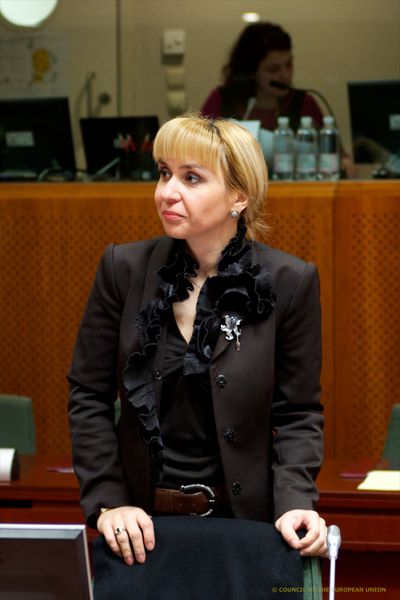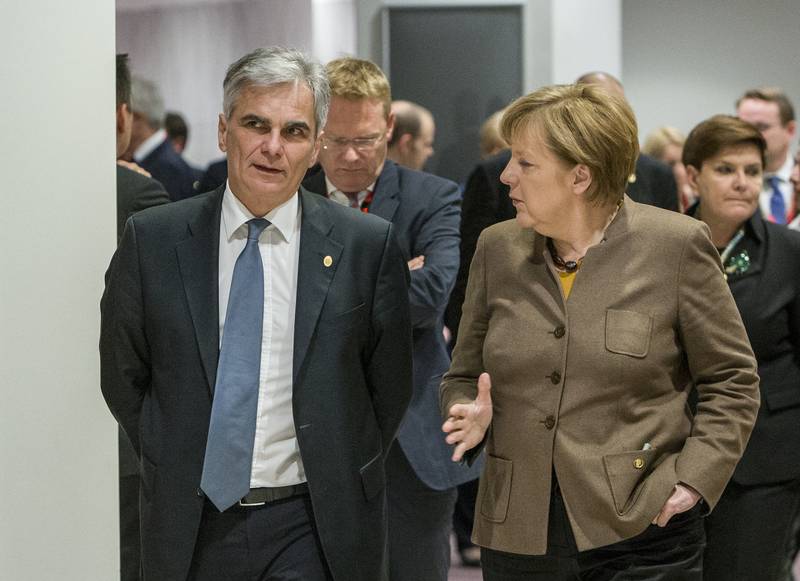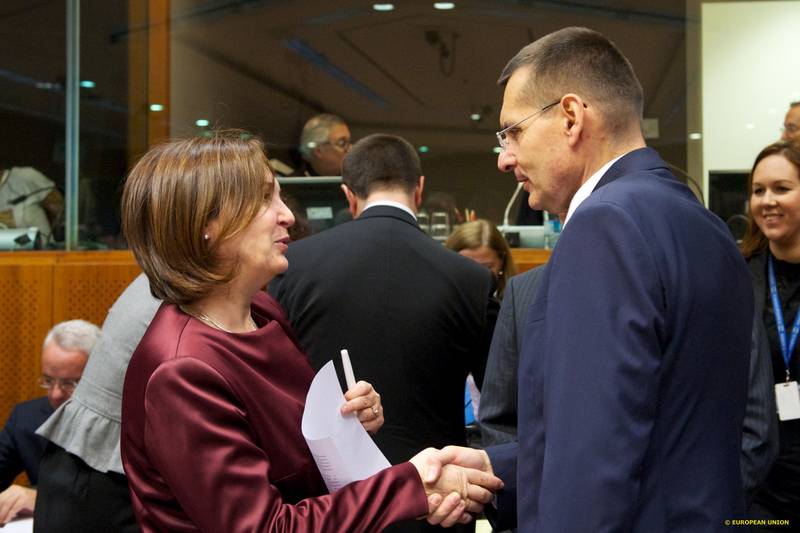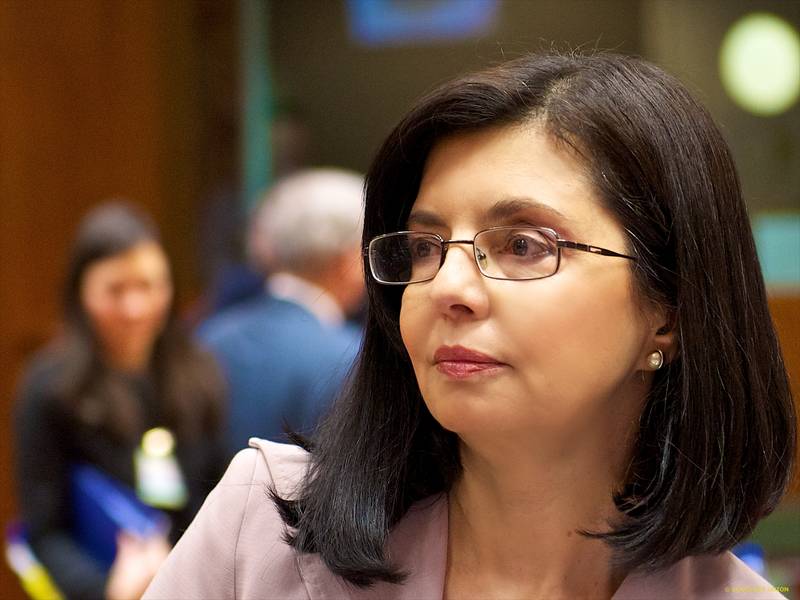Bulgaria's Schengen Shame
Adelina Marini, March 10, 2013
 In the current situation of political mess in Bulgaria, a cacophony of various demands for an overhaul of the political system, of the Constitution and even of the economic orientation, hardly the news that Bulgaria's accession to the Schengen space of security is moving away is among the most shocking ones. But it should be, because Bulgaria's incapability to convince its EU partners that it is ready to participate equally in policing the common external border, to cooperate impartially in the fight against organised crime and corruption and illegal immigration, is in fact an emanation of the failure to implement the necessary reforms.
In the current situation of political mess in Bulgaria, a cacophony of various demands for an overhaul of the political system, of the Constitution and even of the economic orientation, hardly the news that Bulgaria's accession to the Schengen space of security is moving away is among the most shocking ones. But it should be, because Bulgaria's incapability to convince its EU partners that it is ready to participate equally in policing the common external border, to cooperate impartially in the fight against organised crime and corruption and illegal immigration, is in fact an emanation of the failure to implement the necessary reforms.
Bulgaria's and Romania's membership in Schengen has been tossed around for two years in the Justice and Home Affairs Council as a boring issue which does not unfold and only wastes precious times. Again, the ministers of justice and home affairs of the EU postponed taking the decision, since they even included the point on their agenda with the label "state of play", which is more than telling about the attitude. Even before the Council it was clear that aside The Netherlands, resistance to the membership of the two eastern European countries to Schengen have also Finland and Germany. In interview with the German magazine Der Spiegel German Interior Minister Hans-Peter Friedrich firmly states he will veto the two countries' accession if it comes to voting in the Council.
He recalls that the two countries have been evaluated for a long time whether they are ready to be accepted in the Schengen security zone. The latest annual report (under the Control and Verification Mechanism) shows progress, but is insufficient. "Bulgaria and Romania still have to be more decisive in the fight against corruption. Those who acquire a visa through bribery could travel all the way to Germany without further controls", the German interior minister believes. And although not a few German newspapers and also many papers all over Europe tried to attribute Germany's refusal to the upcoming in the autumn general elections, we have to face the truth.
Bulgaria and Romania have been with a mechanism in the area of judiciary and home affairs ever since their accession. It had an expiry date actually of three years as for that long was envisaged to be valid the threat of imposing a safeguard clause unless the two countries reformed their judiciaries. The mechanism has completed 6 years and it seems that it will stay. Not only this, but all confidence credits have been depleted. The outgoing government of Prime Minister Boyko Borissov and his deputy Tsvetan Tsvetanov, who was entrusted with the key Ministry of the Interior, have lost the confidence they got in 2009 when they failed to secure majority at the parliamentary elections.
Brussels's hopes and of the member states as well that since a former police chief and his right hand take over then it is possible to expect that the long-awaited results will ensue. Not only that results never came, but the European politicians and public started to get acquainted with information about Prime Minister Borissov's complicity with the crime world. Although he denied a number of times his links with members of the organised crime, doubts remained. They are also included in the wires of the American embassy in Sofia to the Department of State, revealed by WikiLeaks.
The Schengen agreement has been established with the aim to remove internal borders in order to facilitate integration and the free movement of people. The price of freedom, however, requires full harmony in rules for visa issuance, asylum and full cooperation and coordination among the police forces and the judiciary to protect internal security, especially in terms of fight against organised crime. For the purpose, the Schengen Information System has been created through which information is exchanged about certain categories of people and goods. When you remember the sporadic pop up of someone's file in the public domain, the access to which is supposed to be strictly controlled, probably you will not find it difficult to come to the conclusion that it is not impossible information in the system to be misused.
And that is regarding organised crime. Now, let's imagine what is the situation with corruption! How many members of Boyko Borissov's government left their positions because of falsified diplomas? This is corruption. How many members of the ruling party failed to clean their names after allegations for corruption or conflict of interest? And if in Germany the minister of education was forced to resign because of plagiarism, what can we say about Deputy PM and Minister of the Interior Tsvetan Tsvetanov who failed to explain why does he have 6 apartments?
Let's also remember the case of Kalina Ilieva, the former chief of the state fund Agriculture, whose German diploma was counterfeit. And as she was not the only one with a counterfeit diploma, in Bulgaria quite quickly the label "kalinka" emerged (kalinka comes from the name Kalina but it also means a lady-bird) for everyone who moved up  in the hierarchy not on the basis of merits, but by cheating. How then can a state be trusted to preserve the common Schengen border if it is unable to protect itself from "counterfeit" servants? Can you put your hand on your heart and say that you believe it is impossible at a Bulgarian external border to carry something after paying a bribe? Or to issue a visa against a not very large sum of money? The very fact that so many false diplomas come to light shows the level of corruption in the area of tertiary education.
in the hierarchy not on the basis of merits, but by cheating. How then can a state be trusted to preserve the common Schengen border if it is unable to protect itself from "counterfeit" servants? Can you put your hand on your heart and say that you believe it is impossible at a Bulgarian external border to carry something after paying a bribe? Or to issue a visa against a not very large sum of money? The very fact that so many false diplomas come to light shows the level of corruption in the area of tertiary education.
Let us also not forget the "Veneta Markovska" case, proposed by the ruling majority for a member of the Constitutional Court in spite of the signals for conflict of interest and trade with influence. The pressure Ms Markovska to take an oath was huge and led to an indeed miserable situation when President Rosen Plevneliev left the ceremony before she took oath. This case caused the European Commission to threaten that it was possible to come up with an extraordinary report under the Control and Verification Mechanism, but it did not do that.
The state-run Austrian newspaper Wiener Zeitung writes that the refusal Bulgaria and Romania to be adopted in Schengen is hypocritical. The newspaper admits that Sofia and Bucharest should invest more efforts in the fight with corruption and organised crime, but that the decision is hypocritical because off the record it has been spoken for a long time that the two countries were not prepared for EU membership in 2007 and now the Western Europeans give up on problems of which they have been aware for a long time. "So the Romanians and Bulgarians are being held responsible for mistakes the EU as a whole may have made". Sounds legitimate, but untrue. It is a fact that the EU accepted the two countries unprepared, because otherwise it risked these countries never to be able to move even 1 centimetre forward. Thanks to the persistent requests, finger-pointing and threats on behalf of the Commission, these countries are much different today than they were before.
But they are also very far from what they had to be. And if someone was deluded that was the EU itself and its public. The blame lies with the Bulgarians who never managed to demand their governments and leaders to be honest and to be able to say once and for all "no" to corruption and organised crime. Now the Bulgarians again have a chance to ask something in that direction, but instead they want higher wages, lower electricity bills and sufficiently failed politicians are racing to show who will propose the most impossible thing. Moreover, against the backdrop of all the criticism that comes from more and more countries in the EU, including Poland, Deputy Prime Minister Tsvetanov, instead of resigning the first time when The Netherlands insisted membership in Schengen to be bound to progress in the fight against organised crime and corruption, said the other day in Brussels that the main reason for the failure was the government's bad social policy.
No, Mr Tsvetanov, the impoverishment of the Bulgarian citizens is the result of the lack of fight against corruption and organised crime which act like a tumour in the economy and social welfare. Romania's incapability to use in the best possible way the confidence in 2007 by implementing the painful reforms and say good bye to the chains of the mechanism in fact led to the political crisis in the country last year. It is that crisis that provoked the Commission to come up with an extraordinary report on Romania  which goes much beyond the benchmarks of the mechanism. Aside from telling Romanian politicians that they should resign even when there is the smallest doubt in their honesty, the report criticised as well the lack of free and independent media.
which goes much beyond the benchmarks of the mechanism. Aside from telling Romanian politicians that they should resign even when there is the smallest doubt in their honesty, the report criticised as well the lack of free and independent media.
All problems of which neighbouring Bulgaria suffers as well. Alas, the Commission for now is sparing Bulgaria and said last year that the next report for the country will be in the end of 2013. Brussels denies that the reason are the upcoming elections in the country, but it is difficult to come up with a different reason, especially when the Justice and Home Affairs Council, too, decided to review again the applications of Bulgaria and Romania in the end of the year. By then the Bulgarian citizens would have elected their new government and it would have had time to send the first signals which its priorities will be and how will it work. Against the backdrop of the repellent populism squirting from all political parties, as well as the lack of free and independent media, we can safely predict what will be written in the Council conclusions in the end of the year. The easiest thing will be to tell ourselves - "Well, why do we need that Schengen? Why is it so important?". But it's not Schengen that is important. It is the reason why we cannot join it that is.
And instead of puffing up, swearing on the international situation and the hypocritical Europeans, we have to finally feel ashamed for all that we have not done in the past 23 years of transition.
 Werner Faymann, Angela Merkel | © Council of the EU
Werner Faymann, Angela Merkel | © Council of the EU Rumyana Bachvarova, Petre Toba | © Council of the EU
Rumyana Bachvarova, Petre Toba | © Council of the EU Meglena Kuneva | © Council of the EU
Meglena Kuneva | © Council of the EU